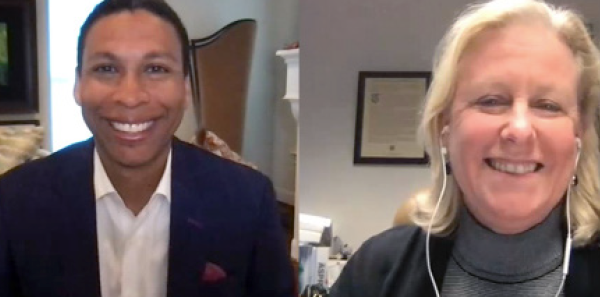
Recently, I sat down with Marianne Gausche-Hill, MD, president of the American Board of Emergency Medicine (ABEM), to discuss the new MyEMCert examination, the board certification process, and some critiques posed by emergency physicians in our New Spin article in January.
Explore This Issue
ACEP Now: Vol 41 – No 02 – February 2022Dr. Cedric Dark: Can you tell us about your role as ABEM president and your “day job” as an emergency physician?
Dr. Marianne Gausche-Hill: I’m currently a practicing emergency physician at Harbor-UCLA Medical Center in Torrance, California. I work in both the pediatric emergency department and the adult emergency department. My full-time job is as the medical director for the Los Angeles County Emergency Medical Services Agency here in Los Angeles County. I oversee all the prehospital care here in LA County—about 88 cities.
CD: MyEMCert is an “assessment for learning rather than an assessment of learning,” you say in our December article. For those who aren’t academics and specifically trained in medical education, can you explain what you mean by this?
MGH: The qualifying exam, which is part of our initial certification examinations, is an assessment of learning. An assessment for learning really integrates all your learning opportunities. In addition, through the process of taking MyEMCert, it’s a more formative approach because it provides immediate feedback. I think that’s helpful in terms of creating an opportunity for those who are participating in the continuing certification process to continue learning.
CD: Our December article refers to changes being considered for initial certification but that it will likely remain a rigorous exam process. We also ran an opinion article from ACEP members arguing that now is the time to do away with the oral boards component. Is that an active consideration?
MGH: We aren’t specifically looking at retiring it, but with that said, everything is on the table as we really look at our initial certification process and try to decide what are the best methods for us to evaluate initial certification.
CD: Why should the public want their doctors to be board-certified?
MGH: Essentially, being board-certified is considered the highest standard. I think one of the things we need to do better is build additional awareness. We do know that the public cares about certification. They don’t necessarily ask us directly, but through the ABMS Certification Matters website, they’re checking hundreds and hundreds of times this year if their emergency physician is board-certified. We know that [patients] care, and I think we could frankly do a much better job at educating the public around that.
CD: The certification time period is decreasing from 10 years to five years. Why was this change made?
MGH: I think some time ago, as an organization, ABEM recognized that the [American Board of Medical Specialties] standards for continuing certification would likely require that the period be shortened. And in fact, as we rolled out MyEMCert, we heard from and surveyed practicing emergency physicians. And within the first two weeks, 13,000 physicians had responded, and what we heard from them is they really don’t want to take a high-stakes exam every 10 years. What they wanted is something like MyEMCert, which is an assessment for learning. We had the opportunity with the transition from 10 to five to allow those in the 2021 cohort to certify by [the MyEMCert] process.
CD: A lot of what we learn now is from online resources, whether peer-reviewed material like UpToDate, crowd-sourced like WikiEM, or FOAM resources such as SGEM or EM Cases, which you can read in ACEP Now. How has that transition informed the changes ABEM is undertaking?
MGH: With our new advances panel, we have a blog to really leverage the best of what’s happening right now in terms of transmission of information and synthesizing that information. Our thought moving forward is how can we leverage both traditional and nontraditional resources to allow and to provide our emergency physicians the opportunity to look things up as they go through this process. The bottom line is we give every physician every opportunity to use those resources that they have available to answer questions.
CD: We always tell our residents, “This is how you answer this question on the boards, but this is how we practice in real life.” How will ABEM make its certification process come closer to true, daily EM practice?
MGH: We don’t have item writers unless they’re working in an emergency department. You don’t want theoretical questions by individuals who are not practicing every day. In addition, every question on our exams requires support in either standard medical text, peer-review journals, etc. And so the bottom line is, if you’re not seeing patients, you’re not writing ABEM tests or module content.
The other thing we do is standard setting panels, where we have individuals who are practicing emergency physicians from all over the country come together and help us determine the pass rate of these and they also vet all the questions on the exam, which is really a rigorous process. And then finally when you take these, any exam that we have, you have the opportunity as someone who’s actually in the middle of taking an exam or afterward to comment on a question. We read all those comments.
CD: What about zebras? Dr. Heather Studley, a physician we interviewed about MyEMCert, liked the new test because it focused less on extremely rare cases—for her written boards, she had five questions on sarin nerve gas. Regarding MyEMCert she says, “If you’re trying to test me on the spectrum of what’s relevant in my practice, it’s definitely not sarin nerve gas.” How do you balance evaluating emergency physicians for the knowledge of common things versus being prepared for the uncommon occurrences?
MGH: Overall, a common message that we’re hearing from physicians is that they prefer the myEMCert format because the content is more relevant. And the goal here is to create scenarios that you’re going to see. We really are moving myEMCert to be really timely, relevant, up-to-date.
CD: How is ABEM tackling the issue of emergency physicians who speak out against proven measures to reduce the impact of the COVID pandemic such as masks and vaccines and advocate for unproven methods such as hydroxychloroquine and ivermectin?
MGH: In April 2021, we released a statement on professionalism, and then in August, we released a statement about misinformation. We have a process in place that allows anyone to report an emergency physician who they think is spreading disinformation about COVID, its treatment, the vaccine, etc. It’s really important to understand that we have a thoughtful process for evaluating these cases. I’ve talked to a number of emergency physicians, and they had great concerns. We talked about what the process was, and they felt a lot more comfortable at the end. And I think just to be clear, all emergency physicians with whom there’s a concern about professionalism have the opportunity to provide ABEM with information about what happened and will be given due process in appeal options.
CD: An opinion article we recently ran says this: “The purpose of initial certification is to objectively and independently confirm that physicians who complete an emergency medicine residency demonstrate core knowledge, skills, and abilities needed to practice emergency medicine at the highest standards. The problem is that ABEM has no evidence to show that it can make this determination.” How do you respond to this accusation?
MGH: I think there’s several things. The examinations are assessed differently than other things in medicine, with randomized control trials (RCT) considered the gold standard in terms of level of evidence. Typically, we can show correlation, but it’s a lot more challenging to show causation. We published a number of articles about certification. One is risk of state medical board disciplinary action. We know that if you were once certified, if you were initially certified as an emergency physician and you let that lapse, you have two and a half to three times the risk of state medical board disciplinary action.
The other thing that we know is that emergency physicians dealing with patients with myocardial infarction not only can identify it and treat appropriately, but it decreases the risk of significant adverse events as well as cost of care if you’re board-certified. And then finally, one of the things we really believe in, noncomplacency in continuing to strive forward. Every year we try to make things better.
ABEM submitted its certification program to an external review by the National Commission for Certifying Agencies and is the first medical specialty board to receive this NCCA accreditation. It’s the highest standard for testing and assessment organizations, and we’re very proud of it.
This interview was edited for brevity and clarity.
Pages: 1 2 | Single Page





No Responses to “The Building Blocks of Board Certification Awareness”